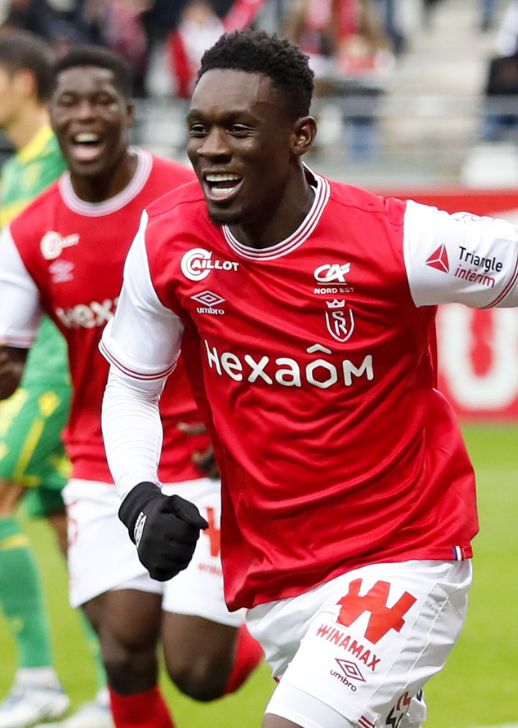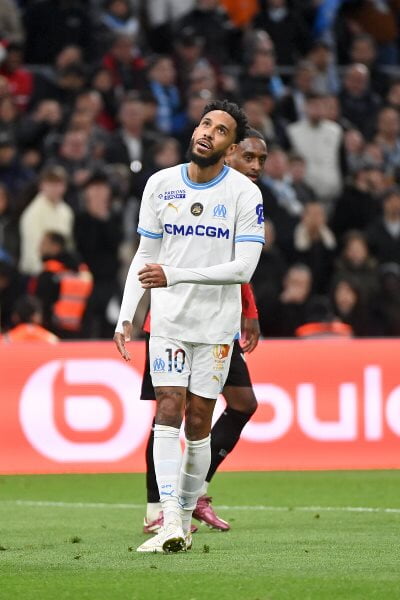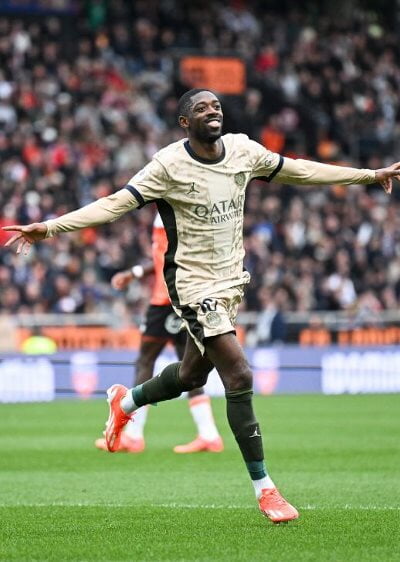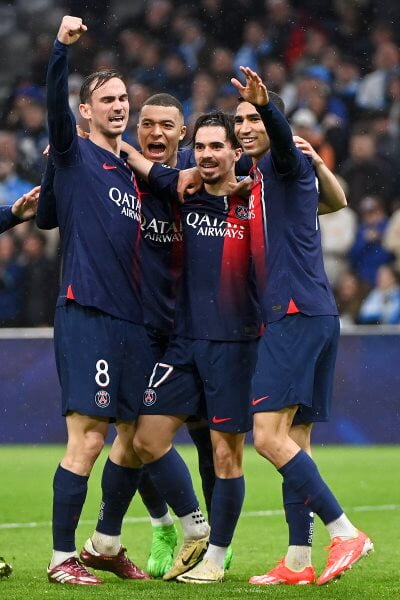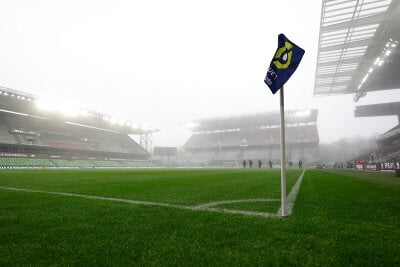On loan from Arsenal, young English striker Folarin Balogun has hit the ground running at Reims and is currently level with Lionel Messi on the Ligue 1 Uber Eats scorers chart. He sat down for a chat about escaping the comfort zone, his progress thanks to contact with Lacazette and Henry, his third-culture lifestyle and his mental toughness. Pt II of a two-part interview.
On a sunny autumn day, Folarin Balogun begins with a polite greeting as he enters the auditorium of the Stade de Reims training centre. He takes a seat in the second-from-last row, explaining with a smile that he has his own seat. In Ligue 1 Uber Eats too, the 21-year-old English striker wasted no time in getting comfortable.
STADE DE REIMS - FC NANTES (1-0) / Highlights (SdR - FCN) 2022/2023
Folarin Balogun scored the winning goal in Sunday's 1-0 win over FC Nantes, which took his season tally to eight goals in 14 games - that's more than half of Reims' goals this season! Thus the uber-talented youngster was in fine mood when he sat down to discuss his taste for risk-taking, adapting to a new league, his international future, his young years with the Gunners and becoming mentally tougher... Pt II of our two-part interview.
Now to talk about your early life, it all started in New York for you...
"Yes, I was born in Brooklyn. My parents were on holiday there for a few months because we have family in New York - my mother has an aunt there. But very soon after I was born, we all moved back to London. Needless to say, I have no memory of that time! But I went back to New York last summer, during my holiday. I had a lot of fun and took the opportunity to walk around the area where the clinic I was born in is located. There's obviously a special feeling for me there."
So it was in London that you started playing?
"Yes, I started at a club called Aldersbrook, in East London, when I was six or seven years old. I played in the local team with my school friends. We had a game every Sunday and at that time I was playing centre-back! I was very fast and I was good with the ball so my coach put me there. I didn't mind because at that age the only thing that matters is to play! I tried cover my teammates' mistakes and, when I had the ball, I made openings for our strikers."
And when did you move to the front line?
"I switched to striker when I was about 10 years old. But I wasn't really a striker actually, I was a winger. At that time, I dribbled quite a lot so I could get past my opponents more easily if I was on the flank."
'My favourite target? Dion Lopy!'
Can you tell us about your childhood in London?
"It was great! It's a special place for me because I have all my friends and almost all my memories there. I don't know anyone who grew up in London who doesn't like it. There's always something to do, be it at the weekend or during the week. I'm very proud to be from London. Reims is a bit different [laughs]. It's quieter here but that's good because I'm a very relaxed person. I didn't have any problems adapting."
What were you like as a child?
"I think my teachers would say I was mischievous, a bit of a prankster. But I was a good kid. I never got kicked out of class or anything like that. I liked to have fun with my mates and sometimes I would tease them in class, or chat..."
And do you still like to joke around?
"Sometimes [laughs]. Maybe not as much as I used to, but when I'm in the mood, I can joke with my Reims teammates or flick them behind the ear. My favourite target? Dion Lopy [laughs]! He also flicks me - almost every day! We give each other a lot of stick!
'I thought he was looking for the toilet...'
Going back to your younger days, how did you end up playing for Arsenal?
"I was playing in a tournament with my club Aldersbrook when I was about ten or 11. It was an all-day tournament with five or six games in total. We qualified for the final and I was having a very good tournament. I was playing well and scoring goals. While we were warming up before the final, I realised that someone was talking to my father on the sidelines. A man I had never seen before. I thought he was looking for the toilets or the refreshment room. Afterwards, I scored and we won the final 1-0. I was very happy. I still remember how we celebrated the victory with the rest of the team. On the way back to the car, I was clearing the dirt off my boots when my dad handed me a business card from the man who had come to talk to him earlier, an Arsenal scout who was offering us a trial the following week. Between this news and the tournament win, I was ecstatic! What a feeling! I couldn't believe it!"
And how did the trial go?
"It lasted five or six weeks, but after four weeks my father received a phone call from Tottenham. They also offered me a trial. We hesitated because Arsenal had to make up their mind about me soon. In the end, my father took me to Arsenal training on Mondays, Thursdays and Fridays. And on the other days of the week, I trained with Tottenham. It was intense because as well as playing for both teams, I was going to school of course. Everything ended well though, because Arsenal finally offered me to sign and we accepted."
Did you support Arsenal?
"No, I was a big football fan but I didn't support any particular team. For me, it was mainly Ronaldo the Brazilian [smile]!"
'I was one of the worst players in my team'
Would you say that it's helpful to have come up at a big club or does it bring extra pressure through weight of expectation?
"I think you progress a lot faster and you become an adult faster. In a big club, a lot of young people are pushed out every year. When you are so young and you are not kept on, it can be a huge slap in the face. As a result, you learn very quickly that you have to improve constantly if you want to stay. Playing in a renowned academy also allows you to progress more quickly because the technical level is better there. You learn a lot because you are trained by - and you train with - the best in the country. In the end, whether you come from a big club with high expectations or a smaller club, you have to show what you can do. It doesn't matter if I come from Arsenal and people have a lot of expectations because no one will expect more from me than myself. As long as I'm happy and I'm at the level I hoped for, everything is fine."
You mentioned the fear of not being kept on. Were there times when it looked dicey for you?
"Yes. From the age of 16, Arsenal offers a scholarship to some of its players. The season before I turned 16, I was one of the worst players in my team, I wasn't playing very well... At the end of the season, I had a discussion with the coaches and it wasn't very positive. They told me that I was not at the level they expected. I thought they weren't going to keep me. It made me think, but I told myself I only had two options: go hard or go home. And, at 16, I had my best season ever. I was the top scorer in the team, I must have scored 40 goals. Even I was shocked at the transformation."
Did you just need a trigger or were there physical reasons behind this change?
"It was mostly luck! I was still playing as a winger at the time and one day the coach put me in the centre. I scored two goals in that game. The next game, he put me up front again and I scored. The same thing happened the next game. Everything went perfectly. By playing up front, I learned the basics of the position. And I had a lot of excellent role models in front of me. For a few weeks, Thierry Henry even came to coach the youngsters at the academy. I was shocked by how good he was! We worked together in front of the goal and, despite his age, he was still so strong! And a little later, in the first team, I was training with Alexandre Lacazette and Pierre-Emerick Aubameyang in particular. They gave me a lot of advice."
What do you think you learned from them?
"What struck me most about Alexandre Lacazette was his technical quality. His first touch is always very clean and he is able to hit the ball effectively in many different ways. Alex is also very strong in his movements. That's what I tried to draw inspiration from. And Aubameyang, he's ruthless in front of goal. He's a machine. He showed me how to finish moves depending on the position: "If the goalkeeper is here, you have to aim for this area". They probably didn't realise it but I was always watching them."
'Thierry Henry told me to hang on'
You were talking about Thierry Henry. You must have seen him since then, in his pundit outfit...
"I saw him at an Arsenal-Tottenham derby. I wasn't in the squad that day and, as I was walking to my seat in the stand, I passed Thierry without seeing him. He grabbed my arm to greet me and ask me how I was. He told me to hang in there and he had some pretty strong words to motivate me, including 'If you think you have the potential to play for Arsenal, then show it'. To this day I remember his encouragement vividly."
You were sent off several times during your youth years but this season you have only received one yellow card in 14 Ligue 1 Uber Eats games. Is that something you've been working on?
"Most of those red cards were because of frustration. For example, I remember a game where we were losing 3- or 4-0. I was very angry and I got a red card for a tackle that was too strong. With time, I learned to manage my emotions and to get past the negatives. It was when I started playing professionally with Arsenal that I started to work on the mental aspect. At this level, a card can ruin your side's match and you let everyone - your team-mates, the fans, your family, yourself - down. Mental preparation is very important for many great players, Ronaldo in particular. And that makes sense, the best players have to be on the pitch. If you are not on the field because of a card, you cannot help your team. With maturity, I have changed my perspective. And as I see myself as a player who has to help the team, I have an obligation to be on the pitch."
'It doesn't matter how you talk to me'
In recent years, Arsenal have relied heavily on players from the youth academy, starting with Bukayo Saka, with whom you have played a lot...
"We are very close because we were together in the youth academy; we're both from the 2001 generation. We were very close at the time and we still talk a lot today. He's a good guy, humble. What the public can see of him on social networks reflects the truth. Bukayo has a big heart. I'm very happy to see him succeed with Arsenal and I'm sure he will continue to progress."
Thanks to the documentary All or Nothing on Arsenal, we know a little more about Mikel Arteta's methods as a coach. Can you tell us about the former PSG player?
"I watched some parts of the documentary and here too, the images perfectly reflect what he is like in real life. Mikel is a very intelligent person, with different communication techniques depending on the player he is talking to. He knows that some players need to be shouted at to make them listen, while others prefer a more sedate approach. And on the pitch, he's technically and tactically very good. He knows what he's talking about."
And what about you?
"I think I've reached a stage where, no matter how I'm spoken to, I know what to do and, above all, I know when I've done something wrong. It's not about the form of the speech, it's about listening to what you're told and taking it on board so that you can progress."
'Two Balogun shirts on the pitch!'
You have almost 30 caps for England's youth teams and you have been a starter with the U18s for the past year, but you have also played a few games with the USA U18s...
"Yes, when I was 17, the US federation offered me a friendly tournament in the Czech Republic in the summer. I had played for England in the Euro U17 a few months before, but after talking to my family I decided to go. And we won the tournament! It was a good experience because I got to see a different way of playing and other methods. I'm still in contact with several people I met there."
Although you've been playing for England for more than four years, you also have the opportunity to represent not only the USA but Nigeria, your parents' country. You get asked a lot of questions about this. Is it difficult to deal with at your age?
"I don't have a problem with it. It's the role of the media to ask these kinds of questions and I accept it. I'm going to make a decision soon and that decision will not depend on what the media or people think but on what is best for me. We will talk about it quietly with my family."
How does this mix of cultures manifest itself in your daily life?
"Because my parents are Nigerian, their first language is Yoruba. I have a lot of family in Nigeria. My mother also has family in New York and Atlanta, with whom we exchange regularly and who sometimes visit us in London. And London is my city, it's where I grew up, where my friends are, and if people ask me where I'm from, I say I'm English. But yes, I am a mixture of all these cultures."
In the Nigerian team, there is already a Balogun...
"Yes, Leon Balogun! We're not related but I've played against him before! It was in a pre-season friendly between Arsenal and Rangers a little over a year ago. By the way, we both had the number 26 so there were two Balogun number 26 shirts on the pitch [laughs]. After the game, we had a little chat together. I think he's playing for Queens Park Rangers this season."
'I understand the difficulty of what Sergio Ramos is doing'
Apart from Leon Balogun, you've already faced defenders like Thiago Silva, Raphaël Varane, Antonio Rüdiger or more recently Marquinhos and Sergio Ramos. Who has caused you the most problems?
"I would say Sergio Ramos. It was complicated against him. He's strong and he's so intelligent. You can tell he has a lot of experience. When I was going to press him, he would wait for me to get close to him to make his pass and that was it, I was out of the way and he could make a one-two. There are a lot of little details that the public might not notice, but as someone who plays football at a high level, I understand the difficulty of what he does. His career and his record speak for themselves. He has won the World Cup, several Champions Leagues... When you have a record like that, it means you are obviously very good. The same goes for Raphaël Varane, whom I played against in the FA Cup with Middlesbrough. He has a lot of qualities: he's quick, he's strong... They're among the best defenders in the world and I love playing against them because it allows me to see how far I still have to go and where I need to improve."
Your next chance to see Folarin generally impressing the hell out of French football fans comes on Sunday afternoon, when Reims travel to the southwest for a swashbuckling challenge against Montpellier in the last round of Ligue 1 Uber Eats action before the World Cup in Qatar.
>> Folarin Balogun: Messi, Neymar don't play in 'farmers league'

